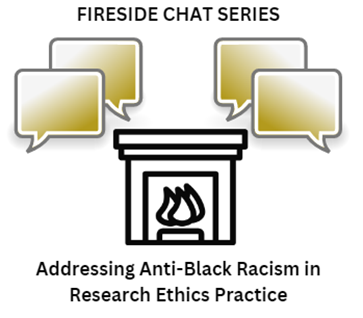
The CAREB-ACCER Board of Directors (“BOD”) has made a commitment to engage in cultural competency training and make accessible to its membership and the broader Canadian research community, cultural competency training with an initial focus on anti-Black racism and equity education in support of its efforts to dismantle existing systems of oppression within the Canadian research ethics sector.
Objectives
As a national research ethics organization with a vision to: (1) promote professionalism through the sharing of expertise, experience, information and knowledge; (2) represent and communicate the perspectives and concerns of Research Ethics Board (REB) professionals in local, national and international policy development and implementation; and (3) provide education and resources needed to successfully promote the ethical conduct of research CAREB-ACCER is obligated to be part of leading the change in the Canadian Human Research Ethics field as it relates to Anti-Black Racism. In order to do this CAREB-ACCER, has embraced the important concepts of:
- Accountability, specifically individual and organizational accountability; and
- Learning through this Initiative.
Rationale & Purpose
Through a focus specifically on anti-Black racism, and a commitment to unlearning our own biases and minimizing our role in reinforcing systems of oppression CAREB-ACCER is equipped to lead the charge in the Canadian Human Research Ethics field as it relates to addressing anti-Black racism and all forms of racism and prejudice within the research ethics field. Our focus on anti-Black racism is an important distinction given the absence of discussion, action and focus on this issue in the broader area of diversity and anti-oppression work in the Canadian Human Research Ethics space. With the work we have begun in our own learning and unlearning, the under representation of this issue in the Canadian research ethics context (both content and education) and our national and international reach, we are committed to addressing anti-Black racism. Through this work we strive to be an enabler in solving a lot of the systemic issues that affect populations that are victims of racism, oppression and prejudiced systems in the Human Research Ethics space through education, awareness and action. As a national organization and leader in research ethics, it is critical that we enable and encourage anti-Black racism discussions, education and action to equip research ethics boards and researchers on how to approach research with an equitable and diverse lens.
Our Addressing Anti-Black Racism in Research Ethics Practice Fireside Chat Series aims to enable knowledge exchange and sharing of examples of knowledge to action in this space.
Goals
Through this series lead discussants will share the approaches, tools and strategies they have implemented specifically focused on addressing anti-Black racism in human research ethics practices. Discussion among attendees and lead discussants will be facilitated through this series of events designed to empower adaptation and adoption of approaches, tools and strategies shared. Through this series and the knowledge, tools, practices, and resources shared, CAREB will establish a Research Ethics Anti-Black Racism Knowledge to Action Community of Practice among our active CAREB membership. Through this community of practice, we strive to advance research ethics practice, process and tools that address anti-Black racism within the Canadian research ecosystem
This series is part of CAREB-ACCER’s six part action plan focused on dismantling existing systems of oppression within the Canadian research ethics sector.
Lead Discussants

Dr. Eva Aboagye, PhD
Dr. Eva Aboagye provides leadership to the program management team in the Office of Research and Innovation at George Brown College. She also provides guidance on and management of research methods and budgets for researchers applying to or holding external research or social innovation grants. From 2015 to 2022, she was responsible for providing guidance in the development of proposals and management of projects funded externally under the Community and College Social Innovation Fund as well as for the internally funded Ignite projects.
Dr. Aboagye has over twenty years of management experience in the postsecondary sector, seventeen of which focused on strategic planning, research, and teaching in the Ontario College system. Eva has published a number of academic articles on equity, diversity and inclusion, including from 2011 to 2014, co- founding and co-editing the Journal of Global Citizenship and Equity Education. In 2021, she co-edited a book “Global Citizenship Education: Challenges and Successes”. Previously, she held several positions at Centennial College including Senior Researcher at the Institute for Global Citizenship and Equity, Director of Policies Pathways and Grants, and Manager of Strategic Institutional Planning. Eva has a PhD and an M Ed in Higher Education from the University of Toronto and a BA and Graduate Diploma in population studies from the University of Ghana.

Dr. Marsha-Ann Scott-Black, PhD
Dr. Marsha-Ann Scott-Black /span> is a critical criminologist, qualitative researcher, and social justice advocate, who is big on doing work that critically assesses systems/programs/policies to identify colonial and/or racist underpinnings with a view to making meaningful change. Dr. Scott-Black has worked as a research assistant and collaborator on various projects, one of which was a study that explored the experiences of faculty, TAs, and students with anti oppressive pedagogic strategies specific to law-related courses within Simon Fraser University’s School of Criminology. Specific to the learning objective “addressing social equities as they relate to law,” the study sought to uncover and document opportunities for intervention in the Canadian undergraduate Criminology legal curriculum to better address its racist and colonial roots. Her research interests include post-colonialism & anti-colonialism; decolonization; critical criminology; comparative criminal justice, particularly informal justice systems of the Global South; garrison communities & their effect on the Jamaican society.

Dr. Nicole Kaniki
Dr. Nicole Kaniki is the Director of Senomi Solutions Inc., an Equity, Diversity, and Inclusion (EDI) Consulting company based in London, Ontario where she supports institutions and organizations in the development and implementation of EDI strategies. Dr. Kaniki has held several EDI leadership roles in post-secondary education in Canada including the Director of EDI in Research and Innovation at University of Toronto where in her role she examined, advocated and advanced EDI in all aspects of U of T research, innovation and entrepreneurship. She is also the former Special Advisor on Anti-racism to the President at Western University where she supported the establishment of the inaugural office of the Associate Vice-President EDI and contributed to the implementation of significant EDI considerations for the institutional strategic plan. She holds a MSc in Kinesiology, PhD in Health and Rehabilitation Sciences with and emphasis in Measurement and Methods, and a MA in Women’s Studies and Feminist Research. Dr. Kaniki has a passion for social justice and uses an anti-racism and decolonization framework in her EDI work.
Session Details
Session Date: Friday February 2, 2024
Session Time: 1:00pm – 2:30pm EST
Lead Discussant: Dr. Eva Aboagye, PhD
This Session will focus on:
- Developing a mindset to address anti-Black racism: Intentional preparation
- Research Ethics Professional’s role
- Putting into practice the mindset to address anti-Black racism in ethics
Registration link
Session Details
Session Date: Friday February 15, 2024
Session Time: 2:00pm – 3:30pm EST
Lead Discussant: Dr. Marsha-Ann Scott-Black, PhD
This session will focus on: “The Research and the Researcher: Self-Decolonization – Perspectives from a Qualitative Researcher”
Registration Link
Session Details
Session Date: Friday March 1, 2024
Session Time: 1:00pm – 2:30pm EST
Lead Discussant: Dr. Nicole Kaniki, PhD
The session will provide research ethics practitioners, evaluators, and administrators with ethical approaches to using race, and specifically “Blackness” in research studies.
The objectives of the session will be:
- Understanding the concept of race as a social versus proxy variable in research.
- Understanding the use of race in the development of the research question and methods of collection.
- Analyzing and interpreting race-based data that is considerate of historical and current systems of oppression within frameworks of anti-Black racism.
Registration Link
Session Details
Session Date: June 27, 2024
Session Time: 1:00pm – 2:30pm EST
Lead Discussant: Dr. Marsha-Ann Scott-Black, PhD
The fireside chat session will focus on:
- Unpacking some of the ethical principles and requirements of the TCPS2, particularly those that call us to centre the participants – Are all participants considered and treated equally?
- The ethics of addressing anti-Black racism in research – going beyond good intentions
Foreword from the Lead Discussant:
“As noted in my previous session, there is no existing checklist that determines what is or is not anti-Black racism in research. However, as we endeavor to engage in this work it is evident that addressing anti-Black racism in research is emancipatory and strives to be decolonial in both research practice and outcomes. The goal for this session is to be forward-looking, and engage in discussions/conversations on next steps we can take as researchers and REB administrators to promote and support frameworks that address anti-Black racism that can accompany and support the equitable application of the TCPS2 as it relates to addressing anti-Black racism in research ethics practice.”
Séance et détails de l’intervenante principale
Date de la séance: Le 27 juin 2024
Heure de la séance: De 13 h à 14 h 30 (HE)
Intervenante principale: Marsha-Ann Scott-Black, Ph. D.
La conversation au coin du feu portera sur:
Avant-propos de l’intervenante principale :
« Tel que mentionné lors de ma séance précédente, il n’existe pas de liste de contrôle qui permet de déterminer ce qui constitue ou non du racisme envers les personnes noires dans le domaine de la recherche. Cependant, alors que nous nous efforçons d’entamer ce travail, il est évident que la lutte contre le racisme envers les personnes noires dans le contexte de la recherche est émancipatrice et s’efforce d’être décolonialiste en matière de la pratique et des résultats de recherche. L’objectif de la séance est d’adopter une vision anticipatrice et de susciter des discussions sur les prochaines étapes que nous pouvons suivre en tant que chercheurs et administrateurs des comités d’éthique de la recherche (CER) pour promouvoir et appuyer des cadres abordant les problèmes de racisme envers les Noirs, où ces cadres pourraient accompagner et appuyer l’application équitable de l’EPTC-2 dans le contexte de la lutte contre le racisme envers les personnes noires dans la pratique de l’éthique de la recherche. »
Registration Link
CAREB-ACCER Addressing Anti-Black Racism in Research Ethics Practice Fireside Chat series – Session #4: “(Re)working the Narratives: Unpacking Colonial Legacies in Research Ethics Practice – The TCPS-2 and You”
The fireside chat session will focus on:
1. Unpacking some of the ethical principles and requirements of the TCPS2, particularly those that call us to centre the participants – Are all participants considered and treated equally?
2. The ethics of addressing anti-Black racism in research – going beyond good intentions
Foreword from the Lead Discussant:
“As noted in my previous session, there is no existing checklist that determines what is or is not anti-Black racism in research. However, as we endeavor to engage in this work it is evident that addressing anti-Black racism in research is emancipatory and strives to be decolonial in both research practice and outcomes. The goal for this session is to be forward-looking, and engage in discussions/conversations on next steps we can take as researchers and REB administrators to promote and support frameworks that address anti-Black racism that can accompany and support the equitable application of the TCPS2 as it relates to addressing anti-Black racism in research ethics practice.
La conversation au coin du feu portera sur:
1. Analyse de certains principes et exigences éthiques de l’EPTC-2, particulièrement les principes et exigences centrés sur les participants – tous les participants sont-ils considérés et traités de la même façon?
2. L’éthique de la lutte contre le racisme envers les personnes noires dans la recherche – au-delà des bonnes intentions
Avant-propos de l’intervenante principale :
« Tel que mentionné lors de ma séance précédente, il n’existe pas de liste de contrôle qui permet de déterminer ce qui constitue ou non du racisme envers les personnes noires dans le domaine de la recherche. Cependant, alors que nous nous efforçons d’entamer ce travail, il est évident que la lutte contre le racisme envers les personnes noires dans le contexte de la recherche est émancipatrice et s’efforce d’être décolonialiste en matière de la pratique et des résultats de recherche. L’objectif de la séance est d’adopter une vision anticipatrice et de susciter des discussions sur les prochaines étapes que nous pouvons suivre en tant que chercheurs et administrateurs des comités d’éthique de la recherche (CER) pour promouvoir et appuyer des cadres abordant les problèmes de racisme envers les Noirs, où ces cadres pourraient accompagner et appuyer l’application équitable de l’EPTC-2 dans le contexte de la lutte contre le racisme envers les personnes noires dans la pratique de l’éthique de la recherche. »

 Français
Français